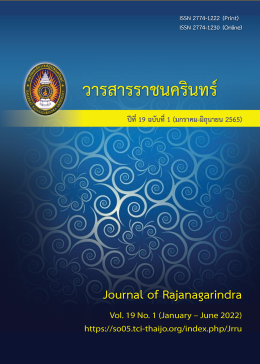THE NEED ASSESSMENT FOR DIGITAL COMPETENCE DEVELOPMENT OF HIGH SCHOOL SCIENCE TEACHER IN SECONDARY EDUCATIONAL SERVICE AREA OFFICE SARABURI
Keywords:
Need Assessment, Digital Competence, Science TeacherAbstract
This research aims to need assessment for digital competence development of high school science teacher in secondary education service area office Saraburi. The sample group was Teachers in science courses secondary level under the secondary education service area office Saraburi 50 people The research tool was a questionnaire. A need assessment form for developing digital competence of secondary science teachers there are 6 components which consist of 1. Professional Engagement 2. Digital Resources 3. Teaching and Learning 4. Assessment 5. Empowering Learners 6. Facilitating Learners’ Digital Competence. The data were analyzed with a computer program to find the mean, standard deviation, Modified Priority Needs Index (PNImodified) and then arrange the results. The results showed that teachers practice and behavior in all 6 digital competence were at a moderate level and there is a need for the development of digital competence of science teachers in terms of evaluation, PNImodified = 0.298. In terms of evaluation The teacher's level of practicality and behavior was moderate and the part of the level that should be practiced has a high level of behavior.
References
กณิชา ศิริศักดิ์. (2559). การวิจัยหลักสูตรวิชาชีพครูเพื่อพัฒนาแนวทางการส่งเสริมสมรรถนะดิจิทัล. (วิทยานิพนธ์
ปริญญาครุศาสตรมหาบัณฑิต, จุฬาลงกรณ์มหาวิทยาลัย)
กรรมประชาสัมพันธ์. (2564). 5 แผนแม่บทสร้างสุขภาวะที่ดีให้กับคนไทย รากฐานสำคัญพัฒนาประเทศให้ก้าวไปอย่างมั่นคง.
เข้าถึงจาก https://www.prd.go.th/th/content/category/detail/id/31/iid/7213.
กอบสุข คงมนัส. (2561). เครื่องมือดิจิทัลเพื่อการเรียนรู้: วิถีแห่งการศึกษายุคดิจิทัล. วารสารศึกษาศาสตร์ มหาวิทยาลัยนเรศวร, 20(4), 279–290.
ชนินันท์ พฤกษ์ประมูล. (2557). การประเมินทักษะกระบวนการทางวิทยาศาสตร์. สุทธิปริทัศน์, 28(86), (352 – 364)
ฐิติวัสส์ สุขป้อม, ณัฏฐกรณ์ ปะพาน, ปิยาภรณ์ เตชะเรืองรอง และอุดม ตะหน่อง. (2563). ครูกับเทคโนโลยีการสอนในศตวรรษที่ 21. วารสารบัณฑิตวิทยาลัย มหาวิทยาลัยราชภัฏจันทรเกษม, 15(2).
นวลจิตต์ เชาวกีรติพงศ์. (2560). การจัดการเรียนการสอนวิทยาศาสตร์เพื่อพัฒนาการคิด. Veridian E-Journal Silpakorn University ฉบับภาษาไทย มนุษยศาสตร์ สังคมศาสตร์ และศิลปะ, 10(2), 484-505.
น้ำเพชร นาสารีย์, รัตนะ บัวสนธ์, ดิเรก ธีระภูธร และสายฝน วิบูลรังสรรค์. (2563). การประเมินความต้องการจำเป็นในการพัฒนาการรู้เรื่องการประเมินของนักศึกษาฝึกประสบการณ์วิชาชีพครูสาขาวิทยาศาสตร์. วารสารมหาวิทยาลัยศิลปากร, 40(2), 78-98.
วุฒิชัย ภูดี และชัยณรงค์ เพียรภายลุน. (2564). อนาคตภาพของครูยุคดิจิทัลหลังจากวิกฤตการณ์โควิด 19, วารสารปัญญาภิวัฒน์, 13(2), 321-330.
สุระศักดิ์ เมาเทือก เกียรติสุดา ศรีสุข น้ำผึ้ง อินทะเนตร และอุไรวรรณ หาญวงค์. (2558). การใช้การสะท้อนคิดเพื่อพัฒนาสมรรถนะครูวิทยาศาสตร์ในการจัดการเรียนการสอนเพื่อส่งเสริมการรู้เรื่องวิทยาศาสตร์ของนักเรียน. วารสารศิลปะศาสตร์ มหาวิทยาลัยแม่โจ้, 3(1), 13-36.
สำนักงานคณะกรรมการการศึกษาขั้นพื้นฐาน. (2564). สพฐ. ร่วมประชุมคณะกรรมการการศึกษาขั้นพื้นฐาน ครั้งที่ 4/2564. เข้าถึงจาก https://www.obec.go.th/archives/428922.
อภินันท์ ธรรมคุณ และกอบกุล สรรพกิจจำนง. (2552). สภาพ ปัญหา และความต้องการเทคโนโลยีสารสนเทศ และการสื่อสารของโรงเรียนมัธยมศึกษา ในจังหวัดศรีสะเกษ. วารสารมหาวิทยาลัยราชภัฏสกลนคร, 1(1), 25-36.
Louise, S., and Anne, Y. (2021). Do digital competence frameworks align with preparing beginning teachers for digitally infused contexts? An evaluation from a New Zealand perspective, European Journal of Teacher Education, doi: 10.1080/02619768.2021.1975109
Redecker, C. (2017). European Framework for the Digital Competence of Educators: DigCompEdu. Publications Office of the European Union, Luxembourg.





